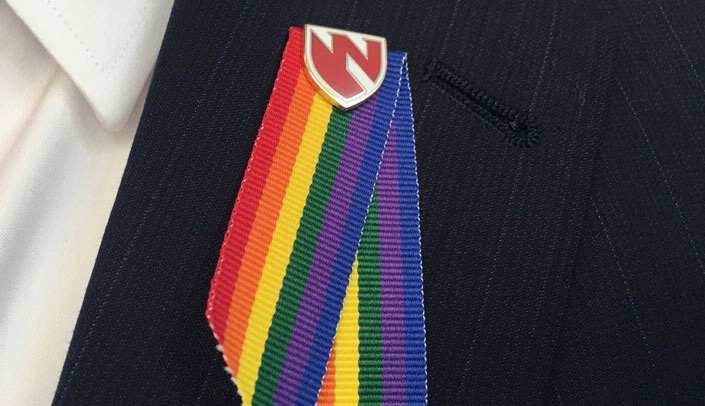The UNMC/Nebraska Medicine LGBTQ+ Employee Alliance marked National Coming Out Day, celebrated annually on Oct. 11, by holding a “Come Out for Crispies” event least week. Departments ordered individually wrapped rainbow rice crispy treats for delivery/pick up on campus. Recipients also got information about Coming Out Day.
About National Coming Out Day
National Coming Out Day, celebrated on Oct. 11, supports lesbian, gay, bisexual, transgender and queer people “coming out of the closet.” The phrase “coming out” applies to all sexual orientations and gender identities, including but not limited, to coming out as gay, lesbian, bisexual, queer, transgender, asexual, nonbinary, intersex, two-spirit, etc.
Coming Out Day is founded on the belief that anti-LGBTQ sentiment thrives in an atmosphere of silence and ignorance, and once people know that they have loved ones who identify as LGBTQ, they are far less likely to maintain homophobic, transphobic or other oppressive views.
The event was an adaption of the alliance’s traditional “Come Out for Cupcakes” tables, which are usually set up around the UNMC campuses to mark the day.
“Normally, we are able to put on social events geared toward our LGBTQ+ employees,” said Arthur Kornitsky, DO, hospitalist and social chair for the alliance. “Unfortunately, due to restrictions on social gatherings, we have been unable to create these safe spaces on campus and in our local community.”
Organizers said that due to the alliance’s innovation during difficult times, the project was a big success. More than 500 rice crispy treats were distributed during the event.
The treats were prepared by Sodexo and distributed by Sodexo employees and alliance members.
“For many individuals, coming out is not limited to a single occurrence — it is an event that recurs throughout someone’s life with each new job, new friendship, new home or even a standard doctor visit,” said Angie Vasa, co-chair of the UNMC/Nebraska Medicine LGBTQ+ Employee Alliance and director of isolation and quarantine at Nebraska Medicine. “Having a day to recognize the significance of these events is important for the LGBTQ community.”
Coming out is an important life experience for many individuals, said Frank Lococo, vice president of marketing communications at Nebraska Medicine, who serves as the alliance’s executive sponsor.
Campus resources
Whether you are in or out at UNMC/Nebraska Medicine, we see and support you. The Human Rights Campaign has a Resource Guide for Coming Out and living openly on your terms. Feel free to reach out to LGBTQ+ Employee Alliance leadership if you need additional resources.
The UNMC/Nebraska Medicine LGBTQ+ Employee Alliance group strives to promote an accepting and diverse culture across the enterprise. In addition to providing mentoring and peer support to LGBTQ+ community members at UNMC and Nebraska Medicine, our activities aim to promote the well-being of LGBTQ+ faculty, students, and staff, as well as to facilitate on-campus educational efforts regarding LGBTQ+ issues.
Membership to the group is open and encouraged for all UNMC and Nebraska Medicine employees. Learn more.
“National Coming Out Day is a great recognition of how, though everyone has their own journey, individuals are able to express their own true selves so that they can live their best life and truly thrive,” he said. “As members of the UNMC/Nebraska Medicine LGBTQ+ Employee Alliance, we recognize the importance of supporting UNMC and Nebraska Medicine’s staff, students and patients on their coming out journeys.”
A new policy at UNMC helps students, faculty and staff be comfortably out by supporting use of an individual’s chosen name and pronouns. On Sept. 15, NU system President Ted Carter signed Presidential Executive Order 40, which allows members of the university community to display their chosen name and gender identity in university information systems. The policy states that a person’s gender identity and chosen name can and should be used wherever possible in the course of university education, business and communication.
In addition to using colleagues’, patients’ and students’ chosen names and correct gender identity markers, including pronouns, Dr. Kornitsky said LGBTQ+ allies can show support by, for example, wearing a rainbow pin or attending a campus Safe Space training.
“Empathy and listening go a long way,” Dr. Kornitsky said. “If an employee tells you about their sexuality or gender identity, do not assume that they are comfortable with everybody else knowing. Each person is at a different point of acceptance when being out and there is no ‘one-size-fits-all’ mentality. If you’re not sure, just ask. Lastly, always remember to be kind.”
